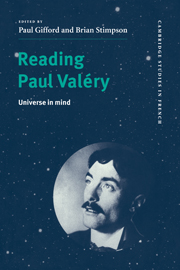Book contents
- Frontmatter
- Contents
- Contributors
- Abbreviations
- Introduction
- PART 1 SELF-SCIENCE
- PART 2 SELF-WRITINGS
- PART 3 BODY, MIND, WORLD
- 13 An aesthetics of the subject: music and the visual arts
- 14 Politics, history and the modern world
- 15 Valéry and the feminine
- 16 Dream and the unconscious
- 17 Self and other: Valéry's ‘lost object of desire’
- Conclusion
- Bibliography
- Index
- Cambridge Cultural Social Studies
16 - Dream and the unconscious
Published online by Cambridge University Press: 04 August 2010
- Frontmatter
- Contents
- Contributors
- Abbreviations
- Introduction
- PART 1 SELF-SCIENCE
- PART 2 SELF-WRITINGS
- PART 3 BODY, MIND, WORLD
- 13 An aesthetics of the subject: music and the visual arts
- 14 Politics, history and the modern world
- 15 Valéry and the feminine
- 16 Dream and the unconscious
- 17 Self and other: Valéry's ‘lost object of desire’
- Conclusion
- Bibliography
- Index
- Cambridge Cultural Social Studies
Summary
No great European poet has provided his readers with a richer prose hinterland than Valéry in his notebooks, essays, dialogues, lectures and occasional writings. It would be a straightforward matter to conclude from the copiousness of these, and from the finesse of Valéry's remarks on the art of poetry in particular, that everything the reader of La Jeune Parque and Charmes could possibly require by way of background knowledge or exegetical commentary had already been supplied by Valéry's own ever-generous pen. When it comes to Valéry's writings on dream and the unconscious, however, the relationship between his works in prose and those in verse has major elements of strangeness and tension. So much so that the entire topic could be examined in terms of the failures of ‘fit’ that exist between what the prose works seem to promise and what the verse provides. To put matters in an excessively simple preliminary form: nothing in the rest of Valéry quite prepares us for the turbulent dreamscape of La Jeune Parque.
Valéry wrote at great length about dreams. It was one of the subjects that exerted a continuous gravitational pull upon him as he wrote his Cahiers, and much that is to be found in his reflections upon consciousness and the self relies for its clarity of definition on dream as a necessary repoussoir notion. The characteristic structures and movements of consciousness were to be found where dream was not: ‘Au fond — aussi — avec ma théorie de la conscience — n'ai-je pas — cherché surtout une délimitation de l'inconscient’ (Ci, p. 333).
- Type
- Chapter
- Information
- Reading Paul ValéryUniverse in Mind, pp. 262 - 279Publisher: Cambridge University PressPrint publication year: 1999
- 1
- Cited by

